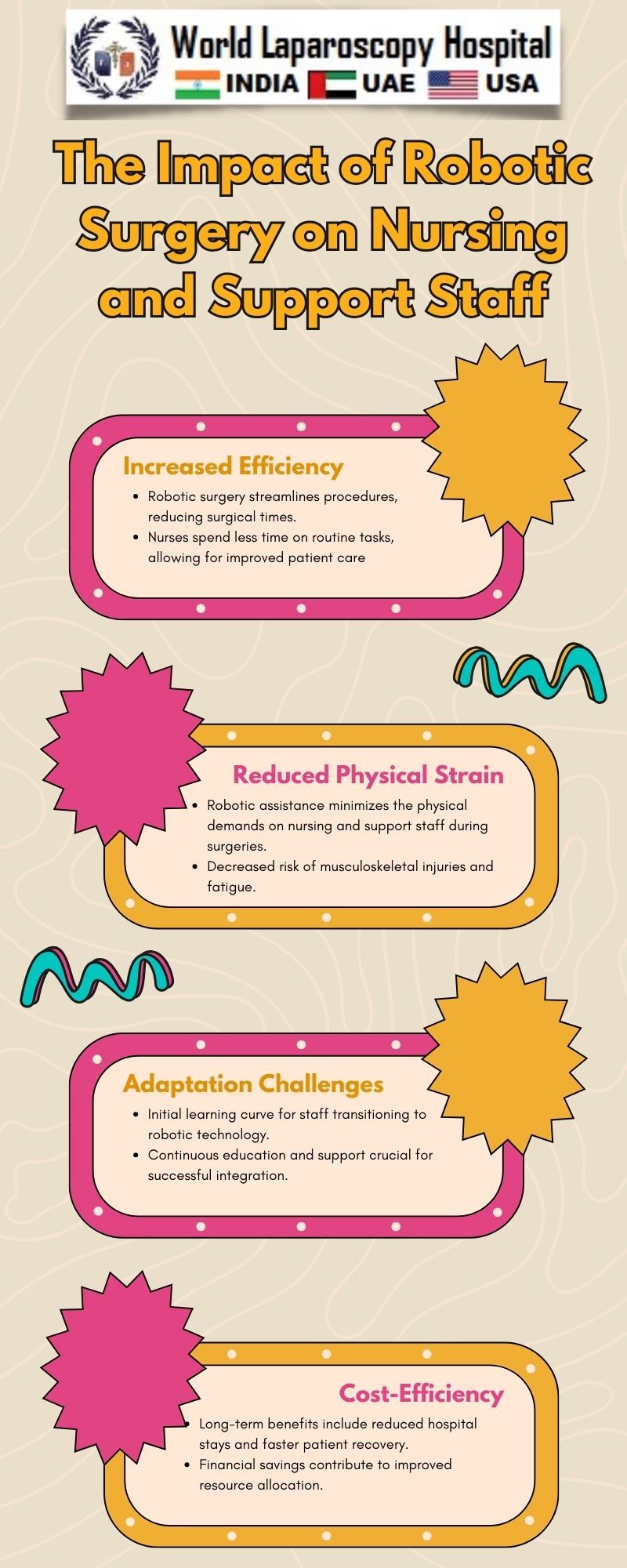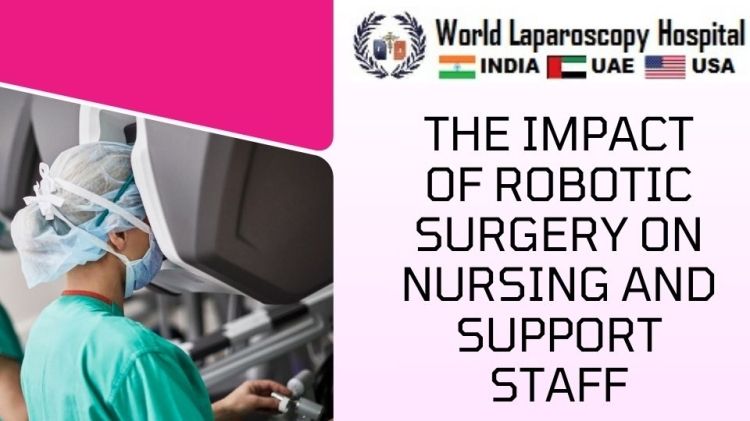The Impact of Robotic Surgery on Nursing and Support Staff
The Impact of Robotic Surgery on Nursing and Support Staff
Introduction
Robotic surgery, a technological leap in the medical field, brings unprecedented precision and efficiency to surgical procedures. This advancement significantly influences the dynamics of healthcare teams, particularly nursing and support staff, who play pivotal roles in patient care throughout the surgical journey.

Evolution of Robotic Surgery
The genesis of robotic surgery traces back to the late 20th century, with the da Vinci Surgical System emerging as a pioneer. Over the years, technological advancements have propelled the evolution of robotic-assisted surgeries, expanding their applications across various medical specialties. This section provides a historical overview and highlights key milestones in the development of robotic surgery.
The Robotic Surgery Process
Understanding the impact of robotic surgery on nursing and support staff requires a comprehensive grasp of the surgical process. From patient preparation to post-operative care, this section delineates the distinct phases of robotic surgeries and the involvement of healthcare professionals at each step. Emphasis is placed on the collaborative nature of their roles in ensuring seamless procedures.
Enhanced Precision and Patient Outcomes
One of the primary benefits of robotic surgery is its ability to enhance precision, leading to improved patient outcomes. Nursing and support staff contribute significantly to this aspect by meticulously assisting in pre-operative planning, instrument setup, and real-time monitoring during surgeries. Their adaptability to robotic interfaces and coordination with surgeons are critical for optimizing the advantages of enhanced precision.
Challenges and Adaptations in Training
The integration of robotic technology necessitates a paradigm shift in the training of nursing and support staff. Challenges arise as these professionals need to acquire proficiency in operating and troubleshooting robotic systems. This section explores the evolving landscape of training programs, simulation exercises, and continuous education to equip healthcare teams with the requisite skills for robotic surgery.
Impact on Workflow and Staffing
Robotic surgery introduces changes to workflow dynamics in healthcare settings. Efficient coordination among nursing and support staff is essential for the seamless integration of robotic procedures into existing protocols. Staffing considerations, such as the need for specialized roles and increased demand for technical expertise, are discussed, shedding light on the broader organizational impact.
Patient-Centered Care and Communication
While technological advancements contribute to improved surgical outcomes, maintaining patient-centered care remains paramount. Nursing and support staff play a crucial role in ensuring effective communication with patients, addressing concerns, and providing empathetic support throughout the robotic surgery experience. The human touch in healthcare remains indispensable, even in the era of advanced robotics.
Ergonomics and Occupational Health
The physical demands of working with robotic systems necessitate a focus on ergonomics and occupational health for nursing and support staff. This section explores the ergonomic challenges posed by robotic interfaces and discusses strategies to mitigate the risks of musculoskeletal disorders and other occupational health concerns associated with prolonged exposure to robotic surgery environments.
Team Dynamics and Collaboration
Effective teamwork is indispensable for the success of robotic surgeries. This section examines the evolving dynamics within healthcare teams, emphasizing the collaborative efforts required among surgeons, nurses, and support staff. The integration of robotic technology underscores the need for clear communication, role delineation, and mutual understanding to ensure optimal patient care.
Ethical Considerations in Robotic Surgery
The ethical dimensions of robotic surgery extend beyond technical considerations. Nursing and support staff navigate ethical challenges related to patient consent, transparency in communicating risks and benefits, and considerations of equity in access to advanced surgical technologies. This section explores the ethical landscape surrounding robotic surgery and its implications for healthcare professionals.
Future Directions and Innovations
As technology continues to advance, the future of robotic surgery holds promises of even more sophisticated innovations. Nursing and support staff must anticipate and adapt to these changes. This section provides insights into emerging technologies, potential challenges, and opportunities for further integration of robotics into healthcare, offering a forward-looking perspective for professionals in these roles.
Conclusion
The impact of robotic surgery on nursing and support staff is nuanced and multifaceted, encompassing technical proficiency, adaptability to change, ethical considerations, and the preservation of patient-centered care. As healthcare systems evolve, these professionals are at the forefront of embracing and optimizing the benefits of robotic technology while navigating the challenges inherent in this transformative era of surgical innovation.
Top
Introduction
Robotic surgery, a technological leap in the medical field, brings unprecedented precision and efficiency to surgical procedures. This advancement significantly influences the dynamics of healthcare teams, particularly nursing and support staff, who play pivotal roles in patient care throughout the surgical journey.

Evolution of Robotic Surgery
The genesis of robotic surgery traces back to the late 20th century, with the da Vinci Surgical System emerging as a pioneer. Over the years, technological advancements have propelled the evolution of robotic-assisted surgeries, expanding their applications across various medical specialties. This section provides a historical overview and highlights key milestones in the development of robotic surgery.
The Robotic Surgery Process
Understanding the impact of robotic surgery on nursing and support staff requires a comprehensive grasp of the surgical process. From patient preparation to post-operative care, this section delineates the distinct phases of robotic surgeries and the involvement of healthcare professionals at each step. Emphasis is placed on the collaborative nature of their roles in ensuring seamless procedures.
Enhanced Precision and Patient Outcomes
One of the primary benefits of robotic surgery is its ability to enhance precision, leading to improved patient outcomes. Nursing and support staff contribute significantly to this aspect by meticulously assisting in pre-operative planning, instrument setup, and real-time monitoring during surgeries. Their adaptability to robotic interfaces and coordination with surgeons are critical for optimizing the advantages of enhanced precision.
Challenges and Adaptations in Training
The integration of robotic technology necessitates a paradigm shift in the training of nursing and support staff. Challenges arise as these professionals need to acquire proficiency in operating and troubleshooting robotic systems. This section explores the evolving landscape of training programs, simulation exercises, and continuous education to equip healthcare teams with the requisite skills for robotic surgery.
Impact on Workflow and Staffing
Robotic surgery introduces changes to workflow dynamics in healthcare settings. Efficient coordination among nursing and support staff is essential for the seamless integration of robotic procedures into existing protocols. Staffing considerations, such as the need for specialized roles and increased demand for technical expertise, are discussed, shedding light on the broader organizational impact.
Patient-Centered Care and Communication
While technological advancements contribute to improved surgical outcomes, maintaining patient-centered care remains paramount. Nursing and support staff play a crucial role in ensuring effective communication with patients, addressing concerns, and providing empathetic support throughout the robotic surgery experience. The human touch in healthcare remains indispensable, even in the era of advanced robotics.
Ergonomics and Occupational Health
The physical demands of working with robotic systems necessitate a focus on ergonomics and occupational health for nursing and support staff. This section explores the ergonomic challenges posed by robotic interfaces and discusses strategies to mitigate the risks of musculoskeletal disorders and other occupational health concerns associated with prolonged exposure to robotic surgery environments.
Team Dynamics and Collaboration
Effective teamwork is indispensable for the success of robotic surgeries. This section examines the evolving dynamics within healthcare teams, emphasizing the collaborative efforts required among surgeons, nurses, and support staff. The integration of robotic technology underscores the need for clear communication, role delineation, and mutual understanding to ensure optimal patient care.
Ethical Considerations in Robotic Surgery
The ethical dimensions of robotic surgery extend beyond technical considerations. Nursing and support staff navigate ethical challenges related to patient consent, transparency in communicating risks and benefits, and considerations of equity in access to advanced surgical technologies. This section explores the ethical landscape surrounding robotic surgery and its implications for healthcare professionals.
Future Directions and Innovations
As technology continues to advance, the future of robotic surgery holds promises of even more sophisticated innovations. Nursing and support staff must anticipate and adapt to these changes. This section provides insights into emerging technologies, potential challenges, and opportunities for further integration of robotics into healthcare, offering a forward-looking perspective for professionals in these roles.
Conclusion
The impact of robotic surgery on nursing and support staff is nuanced and multifaceted, encompassing technical proficiency, adaptability to change, ethical considerations, and the preservation of patient-centered care. As healthcare systems evolve, these professionals are at the forefront of embracing and optimizing the benefits of robotic technology while navigating the challenges inherent in this transformative era of surgical innovation.






